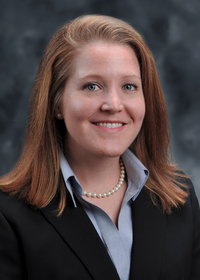Information Possibly Outdated
The information presented on this page was originally released on January 12, 2006. It may not be outdated, but please search our site for more current information. If you plan to quote or reference this information in a publication, please check with the Extension specialist or author before proceeding.
Unsafe food handling can ruin a reception
MISSISSIPPI STATE -- The cake may be beautiful, the table gorgeous and the appetizers terrific, but if the food hasn't been handled and stored properly, guests can go away from the wedding reception with a very bad experience.
Food-borne illnesses are a serious issue, causing more than 80 million illnesses and 5,000 deaths nationwide each year. Symptoms of a food-borne illness can be similar to indigestion, heartburn, a stomach bug or the flu, so many people don't realize what made them sick.
To keep newly married couples reminiscing on the wonderful party rather than how many guests were sickened, keep food safety a top issue at receptions and socials.
Peggy Walker, a nutrition and food safety area agent with the Mississippi State University Extension Service in Panola County, said healthy bodies can fight off low numbers of food-borne microorganisms.
“High risk groups are the very young, elderly or those with compromised immune systems, but with high numbers of microorganisms, anyone can fall victim to a food-borne illness,” Walker said.
The main culprit is time and temperature abuse, or leaving food at the wrong temperature for too long. Bacteria grow best in warm, moist environments, and many foods provide that environment.
“Discard food that is kept between 40 and 140 degrees for two hours as it is at risk of harboring bacteria,” Walker said. “Below 40 degrees are refrigeration and freezing temperatures which slow or kill many bacteria. Above 140 degrees are hot holding and cooking temperatures, which destroy a lot of bacteria. Food kept between these temperatures, however, provides a perfect environment for bacteria to multiply rapidly.”
Potentially hazardous foods include high protein foods such as meat, eggs, milk and cheese, seafood and some carbohydrates. Foods that have been prepared and are ready to be served are also at risk for contamination and must be handled carefully.
The No. 1 rule to remember when planning buffets and receptions is to keep hot foods hot and cold foods cold. Make sure food is at the proper temperature when brought out, then serve cold dishes like salads, seafood and dips on ice. Hot food should be served from hot-holding equipment such as chafing dishes or steam tables.
Prepare two or more trays of the same food for a large, catered event. Hold all unserved foods at their correct temperatures, using insulated containers, refrigerators, freezers or heated storage cabinets. Avoid displaying large amounts of any food.
Serve foods at their optimal quality by serving appropriate quantities on clean serving trays at regular intervals to keep it fresh and at safe temperatures. Use a food thermometer to monitor temperatures.
“When hiring a caterer, make sure they are a legal caterer with a food service permit. This means the caterer's kitchen is inspected by the health department and that someone on staff is certified in food safety,” Walker said. “If friends or family do the catering, make sure they know to keep foods at safe temperatures and monitor the length of time it spends in the danger zone.”
Another key part of the food safety process occurs before food is served.
“Make sure hands and preparation areas are clean and that cutting boards and utensils are cleaned and sanitized before each use. Keep raw foods away from cooked foods, and very carefully wash fruit and vegetables that will be served raw,” Walker said. “Everyone working with food should wash their hands thoroughly and often.”
Disposable tableware makes it simple to provide guests with sanitary plates and utensils. Make sure guests use a new plate with every repeat trip to the food tables.
Carmen Jefcoat, an Extension nutrition and food safety area agent in Smith County, said outdoor receptions and those held in facilities without adequate kitchen space provide additional challenges to food safety.
“Make sure there is safe drinking water available for cooking, kitchenware washing and hand washing,” Jefcoat said. “There must be adequate power for cooking and holding equipment, and there must be trash receptacles for garbage disposal away from the food storage and preparation areas.”
She suggested caterers use insulated containers for all temperature-sensitive foods, and keep the items separate. Transport foods such as fruit and vegetables separate from such things as meats and sandwiches.
“Those responsible for feeding any crowd must remember that foods must be kept at the proper temperature for more than their ideal taste and presentation. Foods held at the proper temperature maintain their quality and retard growth of the microbes that actually spoil food,” Jefcoat said.
Contact: Peggy Walker, (662) 563-6260



